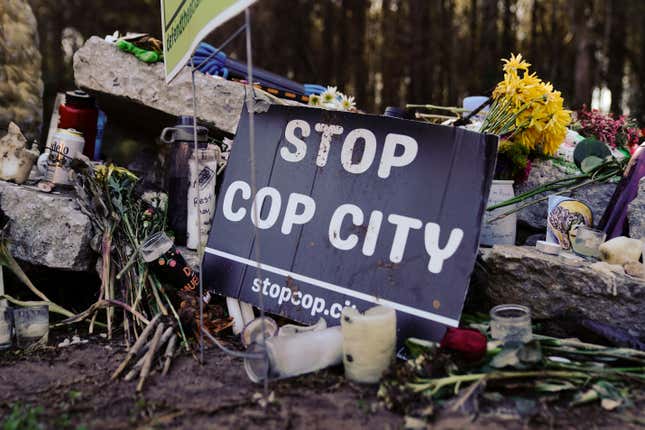
The indictment of 61 protesters in Atlanta, Georgia, earlier this month on RICO charges rocked the nation. Civil liberties groups immediately denounced Georgia Attorney General Chris Carr — who pushed forward with the indictment of Cop City protesters despite objections from local officials.
The Defend the Forest and stop Cop City protesters, who were fighting to prevent the construction of a $90 million police training facility that would have demolished hundreds of acres of the Weelaunee Atlanta forest were indicted under Georgia’s racketeering law. The movement first sky rocketed to national attention when police shot and killed one of the protesters, 26 year-old Manuel “Tortuguita” Terán, during a raid on their encampment. Although law enforcement said he shot first, an autopsy later revealed that he was shot 57 times with his hands raised.
The situation in the Atlanta forest shot back onto the national scene when Carr unceremoniously dropped an indictment — alleging a vast criminal conspiracy targeting protesters. Now these protesters face decades in prison.
The Root sat down with legal experts, who raised serious alarms about the indictment, arguing that it could serve as a dangerous blueprint for future attacks on fundamental civil liberties.
What Is George Floyd Doing in This Indictment?
Before we get into the RICO of it all, we have to talk about one surprise name in this (lengthy) indictment: George Floyd, a Black man whose murder at the hands of Minneapolis police sparked a national reckoning in 2020.
Georgia’s Republican Attorney General dated the start of the so-called criminal conspiracy to prevent the construction of Cop City to Floyd’s death. There was only one problem... Floyd died almost a year before the announcement of Cop City.
Floyd’s addition in the indictment makes it clear that this is about pushing a political agenda, says Georgia ACLU Policy Director Chris Bruce.“He’s criminalizing people’s opinions on Black men being murdered,” says Bruce, “instead of focusing on what’s important which is public safety, which as the top prosecutor in the state, he’s in charge of.”
Paul Henderson, a former San Francisco Prosecutor and Director of San Francisco’s Department of Police Accountability says it’s clear this is about targeting a movement, not criminal activity.
“[The indictment] feels targeted to the reaction to George Floyd,” says Henderson. “They are focusing on the cause rather than the actions themselves.”
Why The Use Of RICO Is Raising Alarms
The use of RICO in this case is also worth examining. “RICO laws were never supposed to be used in this nature,” argues Bruce. “This is a breathtakingly broad and unprecedented use of RICO, state terrorism, and money laundering laws against protesters. And the Attorney General Georgia, Chris Carr, is wielding the sweeping law to stigmatize and target those who disagree with the government.”
Bruce isn’t just making assumptions when he talks about the intention of Georgia’s RICO statute. “Georgia’s RICO law was passed in 1981. It was based off of the Federal RICO statute, and the purpose of the federal RICO statute is to go against crime mob bosses,” he says. “When it was passed, the Georgia legislature itself said that it is not supposed to be used to prosecute civil disobedience.”
The overwhelming majority of people indicted weren’t charged with any violent or criminal activity outside of their association with the Defend the Forest and Cop City movement. Most of the protesters were charged for committing “overt acts,” i.e., actions that, while not inherently criminal, allegedly furthered the criminal conspiracy. For example, one protester was listed as having furthered the conspiracy because he reimbursed someone living in the woods for $11 worth of glue.
“That is not something I’ve ever seen before,” says Henderson, a former Prosecutor. “[RICO] is such a powerful tool, and it’s a very dangerous one when used in subjective ways...There were very few people charged with the actual violence... but using RICO, they are now tied to specific violence they may or may not have condoned.”

